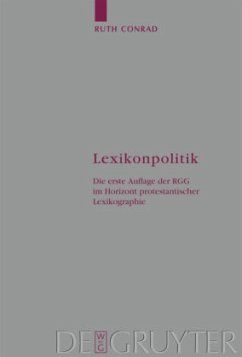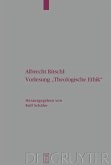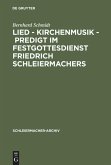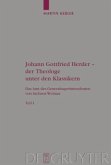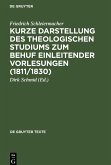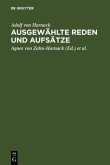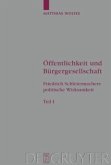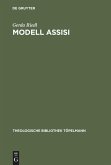â??Die Religion in Geschichte und Gegenwartâ? (RGG) (Religion in Past and Present ), and its first edition in particular, achieved a significant position in the history of theology like no other encyclopaedia. On the one hand, it lent expression to the dominant theological trends of its time, while on the other it provided theological impulses of its own.This study recreates the importance of the RGG for the history and politics of theology in the context of the publishing history of Protestant lexicography. Lexico-political issues are discussed with regard to aspects of academic, theological, educational and publishing policies.The study closes a gap in the research, as theological encyclopaedias have hitherto been seen as a neglected field of research.
Wie kein anderes Lexikon hat Die Religion in Geschichte und Gegenwart (RGG), zumal in ihrer ersten Auflage, theologiegeschichtliche Bedeutung erlangt. Sie hat einerseits der je herrschenden theologischen Strömung ihrer Zeit Ausdruck verliehen. Andererseits hat sie selbst der Theologie Impulse vermittelt. Die Arbeit zeichnet diese theologiegeschichtliche und theologiepolitische Bedeutung der RGG im Kontext der buchgeschichtlichen Entwicklung protestantischer Lexikographie nach. Die lexikonpolitische Fragestellung wird im Hinblick sowohl auf wissenschafts-, theologie-, bildungs- und verlagspolitische Aspekte erörtert. Die Arbeit schließt eine Forschungslücke, galt doch die theologische Lexikalik bislang als weitgehend unerforscht.
Wie kein anderes Lexikon hat Die Religion in Geschichte und Gegenwart (RGG), zumal in ihrer ersten Auflage, theologiegeschichtliche Bedeutung erlangt. Sie hat einerseits der je herrschenden theologischen Strömung ihrer Zeit Ausdruck verliehen. Andererseits hat sie selbst der Theologie Impulse vermittelt. Die Arbeit zeichnet diese theologiegeschichtliche und theologiepolitische Bedeutung der RGG im Kontext der buchgeschichtlichen Entwicklung protestantischer Lexikographie nach. Die lexikonpolitische Fragestellung wird im Hinblick sowohl auf wissenschafts-, theologie-, bildungs- und verlagspolitische Aspekte erörtert. Die Arbeit schließt eine Forschungslücke, galt doch die theologische Lexikalik bislang als weitgehend unerforscht.
"Das Buch ist eine Fundgrube, auch bibliographischer Art." -- Johannes Wischmeyer in: Zeitschrift für neuere Theologiegeschichte 14/2007
"In summa: Einer besonderen Empfehlung bedarf diese Untersuchung nicht. Sie empfiehlt sich selbst durch Themenwahl und exzellente Durchführung."
Hasko von Bassi in: Theologische Literaturzeitung 134.9/2009
"Das Buch ist eine Fundgrube, auch bibliographischer Art."
Johannes Wischmeyer in: Zeitschrift für neuere Theologiegeschichte 14/2007
Hasko von Bassi in: Theologische Literaturzeitung 134.9/2009
"Das Buch ist eine Fundgrube, auch bibliographischer Art."
Johannes Wischmeyer in: Zeitschrift für neuere Theologiegeschichte 14/2007

